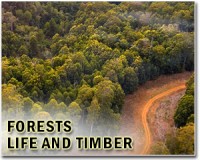 |
Cancun, Mexico (AFP) Dec 6, 2010 A global climate treaty looks far off, but negotiators say talks in Mexico may reach one key agreement -- on how to fight deforestation, a top cause of carbon emissions. A pact on reducing emissions from deforestation in developing countries -- known to negotiators as REDD -- would consist largely of offering financial incentives to developing countries such as Brazil, Indonesia and the Democratic Republic of Congo to save their tropical forests. "It's the time to act, here and now, with the support of all countries to approve a REDD deforestation reduction plan," Mexican President Felipe Calderon said Sunday, which organizers dubbed "forest day" at the climate negotiations underway in the resort of Cancun. Some 13 million hectares (50,000 square miles) of forest are cut down each year -- the equivalent of the size of England -- to provide timber or make way for grazing land. Over the past 15 years, deforestation has accounted for between 12 and 25 percent annually in the global emissions blamed for global warming due to the loss of vegetation that balances off the carbon gas produced by industry. Calederon called on countries not only to approve a plan on reducing deforestation but also "from channel international funding, starting right now" to finance the projects. Sha Zukang, the UN undersecretary for economic and social affairs, said funding so far has been insufficient even though the forest issue was critical for "protection of the environment, social development and the fight against poverty." Developed nations have pledged some 4.5 billion dollars for REDD. The leading financial contributor is Norway, which among other projects has committed to provide one billion dollars for Indonesia which plans a two-year moratorium on new clearing of natural forests and peatlands from 2011. But negotiators still need to make progress on disputes on deforestation including on methods of financing and verification. On the funding, some negotiators say that only public money should go to REDD. But others say it is more realistic to set up a market approach that would allow nations to swap assistance for credits in emission reduction goals. "There's a really strong chance that we will get a solid agreement," said Rane Cortez, the senior forest carbon advisor for the Nature Conservancy environmental group. "There is a lot of consensus coming on the text, but we need a few tweaks to get everyone onboard," she said. Critics say that anti-deforestation plans should not simply be a way for wealthy nations to avoid the politically difficult step of cutting industrial emissions. Maria Fernanda Espinosa, Ecuador's coordinating minister for heritage, told AFP that her country was insisting on safeguards before the approval of REDD programs. The conditions, she said, are: "Respecting the rights of indigenous people and providing just compensation for the sacrifices of countries that aren't exploiting their riches and respect the sovereignty" in the forested areas. Ecuador has decided not to explore oil in its Yasuni park in a bid to preserve a stretch of the Amazon which has a population of isolated indigenous people. Representatives of 194 countries are holding talks in Cancun in hopes of making headway on an elusive treaty on climate change. The clock is ticking, with commitments under the Kyoto Protocol running out at the end of 2012.
Share This Article With Planet Earth
Related Links Forestry News - Global and Local News, Science and Application
 American west's forests face troubling carbon trend
American west's forests face troubling carbon trendWashington (AFP) Dec 3, 2010 Crippled by drought, scorched by wildfires and dying from beetle infestations, forests in the American west are struggling and in some states they now exude more carbon than they absorb, experts say. In an attempt to uncover what the future holds for these ancient pine forests, scientists are studying how trees recover and regrow, and what forest managers can do to help them respond to the m ... read more |
|
| The content herein, unless otherwise known to be public domain, are Copyright 1995-2010 - SpaceDaily. AFP and UPI Wire Stories are copyright Agence France-Presse and United Press International. ESA Portal Reports are copyright European Space Agency. All NASA sourced material is public domain. Additional copyrights may apply in whole or part to other bona fide parties. Advertising does not imply endorsement,agreement or approval of any opinions, statements or information provided by SpaceDaily on any Web page published or hosted by SpaceDaily. Privacy Statement |